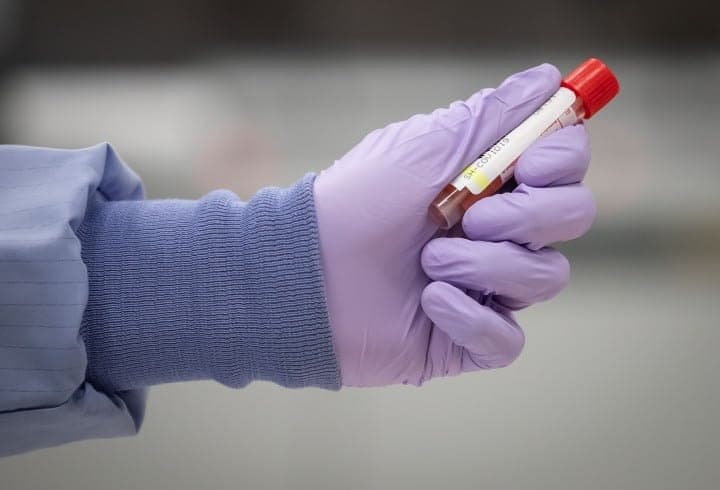McMaster University-led study reveals why COVID can cause blood clots
Published March 24, 2021 at 2:59 pm

Researchers believe they’ve gotten to the bottom of why COVID-19 can lead to blood clots. The results may also explain reports of similar issues being reported after people received the vaccine.
The McMaster University-led study was conducted by drawing blood from critically-ill COVID-19 patients.
Researchers found that the antibodies can contribute to clotting.
Ishac Nazy, an associate professor of medicine and director of the McMaster Platelet Immunology Laboratory, told Brighter World (Mac’s news publication) that the COVID-19 antibodies form immune complexes that activate platelets, which are the cells that form blood clots.
“By discovering the mechanism, we can inform doctors on the use of blood-thinners, known as anticoagulants, that can stop the clotting in COVID-19 patients,” Nazy said in the interview.
Nazy says his laboratory saw a sudden increase in patients with blood clots at the beginning of the pandemic in early 2020.
At first, Nazy and his colleagues thought these patients had heparin-induced thrombocytopenia (HIT), a clotting condition that can occur in patients given heparin—which, ironically, is a blood thinner.
However, Nazy sayd these patients tested negative for HIT, despite being a medium to high risk of the condition. Instead, these critically-ill patients were positive for COVID-19.
Nazy said this discovery gives medical professionals better insight into the underlying mechanisms of COVID-19 and potential future therapies to combat blood clots.
The Oxford-AstraZeneca COVID-19 vaccine has dominated headlines this month after confidence in the shot has plummeted in parts of Europe. Spain, Germany, France and Italy linked rare blood clots to the vaccine and many countries briefly stopped using it.
At one point, 13 countries in Europe stopped administering the vaccine, although many have now resumed its use.
Dr. Menaka Pai, a hematologist and thrombosis medicine physician at Hamilton Health Sciences (HHS), issued a statement that was posted on her social media and on the HHS website, in an attempt to gain the public’s trust in the AstraZeneca shot.
Echoing statements released by Health Canada, the Public Health Agency of Canada, the Medicines and Healthcare products Regulatory Agency (UK), and the European Medicines Agency, Dr. Pai says the benefits of the vaccine far outweigh the risks.
“A lot of common medical procedures, drugs and life experiences (ageing, pregnancy) increase your blood clot risk,” she wrote. “But, we take them on anyway because we’ve weighed our individual risk and benefit in the moment. We do so because we’ve decided that what’s on the other side is worth it…”
There have been cases in Hamilton of blood clots being linked to the vaccines, but Dr. Pai says their vaccine safety and surveillance system is “solid.” It picked up “approximately 40 unusual serious clots “out of 20,000,000+ doses, some associated with low platelets (sticky cells that help your blood clot).”
She added that the biggest driver of blood clots in the COVID-19 landscape is not the vaccine—it’s the virus.
“These rare, serious clots are concerning,” she continued. “But, if you’re eligible for AstraZeneca vaccine, our province is saying you’re at risk for COVID-19.”
“So that ultra-rare risk is outweighed by the real and common risks of COVID-19 – an illness that itself gives you a less than one in 100 risk of blood clots,” Dr. Pai wrote.
A US study also showed Oxford-AstraZeneca is both safe and highly effective.
The large AstraZeneca U.S. Phase III trial published on Monday (Mar. 22) found the COVID-19 vaccine to be 79 per cent effective in preventing symptomatic illness and 100 per cent effective against severe disease and hospitalization.
INsauga's Editorial Standards and Policies